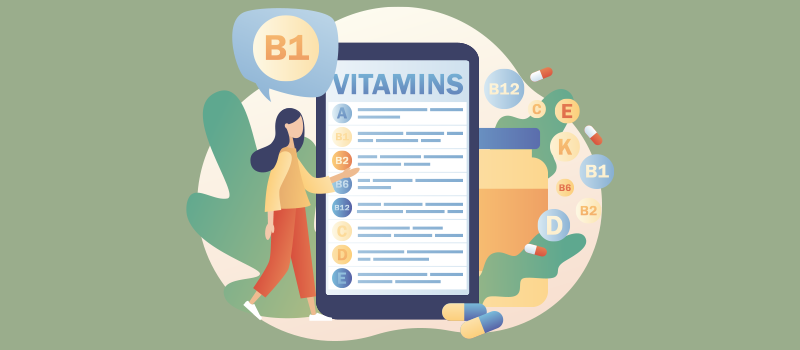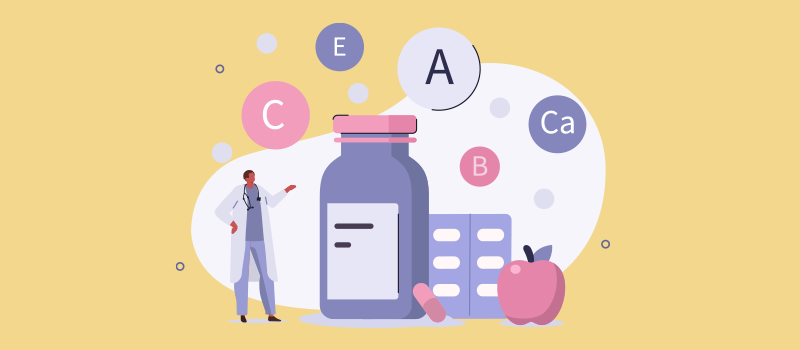What’s the Buzz
The Bee Healthy Blog
Signs You May Have a B12 Deficiency

Vitamin B12 (also called cobalamin) is a water-soluble vitamin. It is an essential nutrient that the body needs to make healthy red blood cells, DNA, and nerves–It also helps carry out other functions. B12 deficiency can lead to various symptoms such as fatigue, nerve problems, and mood changes. Please continue reading to learn more about this vitamin and some of the signs and symptoms of vitamin B12 deficiency.
How much vitamin B12 do I need?
The human body does not make vitamin B12. Therefore, you need to get it from your diet or dietary supplements in order to make enough red blood cells. The average adult should get 2.4 micrograms of vitamin B12 a day.
Good food sources of vitamin B12 include organic meats, beef, poultry, milk, shellfish, fish, eggs, dairy products, wheat germ, soybeans, fortified cereals, nutritional yeast, orange juice, and oranges.
What is vitamin B12 deficiency anemia?
Red blood cells carry oxygen to every part of the body. In people who have a vitamin B12 deficiency, the body cannot make enough healthy red blood cells. This condition is called vitamin B12 deficiency anemia. In this deficiency, the tissues and organs in the body don’t get enough oxygen, leading to many symptoms related to B12 deficiency.
Another B vitamin is folic acid (also called folate). Folate deficiency anemia, like vitamin B12 deficiency anemia, is also a type of megaloblastic anemia. In these types of anemias, the red blood cells don’t develop like healthy red blood cells. Instead, they are very large and oval-shaped. As a result, the bone marrow makes fewer red blood cells (RBCs), and sometimes, the RBCs die sooner than usual.
Who is at risk of vitamin B12 deficiency?
Anyone can develop a vitamin B12 deficiency. However, some people are at greater risk because their diet does not contain enough B12, or their gastrointestinal tract cannot absorb the vitamin properly. Some of the risk factors for vitamin B12 deficiency include:
- Eating a restrictive diet, such as a strict vegetarian or vegan diet.
- Older age (there is reduced stomach acid production with age, and acid in the stomach is necessary to absorb vitamin B12).
- A family history of vitamin B12 deficiency.
- Lack of intrinsic factor (a protein made in the stomach that’s needed for B12 absorption) - this condition is called pernicious anemia.
- Gastric bypass surgery (weight loss surgery).
- Health conditions like Crohn’s disease, celiac disease, thyroid disease, HIV, and autoimmune diseases like type 1 diabetes.
- Certain medications like heartburn drugs which reduce stomach acid production.
Signs and Symptoms of B12 Deficiency
Fatigue
If you’re deficient in vitamin B12, your body can’t make enough healthy red blood cells. As a result, oxygen delivery to various organs and tissues is affected. Lack of healthy red blood cells can make you feel tired with weak muscles. Indeed, fatigue is one of the first signs of vitamin B12 deficiency. You can develop this symptom even when your B12 levels are only borderline low.
Pale or Yellow Skin
Pale skin may indicate a vitamin B12 deficiency and occurs due to a lack of healthy red blood cells. B12 deficiency can also lead to the destruction of immature red blood cells in the bone marrow, which can cause jaundice (yellowing of the skin and whitening of the eyes). Jaundice occurs due to high bilirubin levels (a waste material created when the body breaks down RBCs).
Headaches
One of the most common symptoms of B12 deficiency is headaches. Studies have found that people who experience migraines are more likely to have low B12 levels than people with no migraine history. Further research is needed to determine whether eating foods rich in vitamin B12 or taking supplements can improve headaches.
Fast Heart Rate
People with a B12 insufficiency or deficiency lack enough healthy red blood cells. To make up for this, the heart may beat faster in an attempt to push more blood to the body more quickly and get enough oxygen to reach all the organs.
Shortness of Breath
B12 deficiency anemia can cause a person to feel short of breath. This is believed to be due to fewer red blood cells and a fast heartbeat. If you are experiencing trouble breathing, you should see a healthcare professional right away.
Gastrointestinal Symptoms
A B12 deficiency may cause symptoms such as bloating, gas, nausea, diarrhea, constipation, decreased appetite, and weight loss. It is believed these symptoms occur because the digestive tract does not get enough oxygen due to a lack of red blood cells.
Mouth Pain and Inflammation
A deficiency of vitamin B12 or other nutrients can cause inflammation and pain of the tongue (the medical term is glossitis). Sores and inflammation can also develop inside the mouth (stomatitis). It is common for people with B12 deficiency anemia to have glossitis and stomatitis. These can be signs of an early B12 deficiency or other nutritional deficiencies like folate, vitamin B2 (riboflavin), and vitamin B3 (niacin) deficiency.
Paresthesias
The medical term paresthesias refers to a pins and needles or burning sensation that typically occurs in the hands and feet. This symptom is common in people with a B12 deficiency. However, paresthesias is also a common symptom of nerve damage caused by high blood sugar in people with diabetes — this is called diabetic peripheral neuropathy. Therefore, numbness and pain in the extremities from vitamin B12 deficiency can be mistaken for peripheral neuropathy in people with diabetes. Also, people with diabetes who take a medication called metformin are at a higher risk of developing B12 deficiency because this medication can reduce B12 absorption. If you take metformin regularly, talk to your health professionals about getting screened for vitamin B12 deficiency.
Depression
Vitamin B12 is necessary for the proper functioning of the brain. A deficiency of this vitamin can impact mental health. Studies show that B12 deficiency is linked to an increased risk of developing depressive symptoms, mood disorders, and psychosis. One theory is that mental health problems are caused by high homocysteine levels (vitamin B12 is needed to break down this chemical).
Mental Impairment
Low B12 levels can worsen mental function, especially in older adults. This can manifest as brain fog, difficulty concentrating, and difficulty completing tasks.
Other Signs and Symptoms of B12 Deficiency
In addition to the above, a vitamin B12 deficiency may cause the following symptoms:
- Muscle weakness and muscle cramps.
- Impaired balance and coordination, trouble walking.
- Erectile dysfunction.
- Vision problems due to optic nerve damage.
What Vitamin B12 Does Not Do
According to Harvard Health Publishing, there is no solid scientific evidence that getting enough vitamin B12 can prevent health conditions like heart disease, Alzheimer’s disease, infertility, eczema, and fatigue. For example, while many people with Alzheimer’s disease are found to have low vitamin B12 levels, there is no improvement in cognitive function after supplementation with high doses of vitamin B12.
Diagnosis and Treatment of Vitamin B12 Deficiency
Given that a deficiency of vitamin B12 can affect so many organs in the body, it’s important to seek treatment. People who are at a high risk of B12 deficiency, such as those who eat strict vegetarian diets, should talk to their healthcare professional about screening for this condition.
Your doctor can diagnose B12 deficiency based on your medical history and a physical exam. They might also order a routine blood test like a complete blood count or additional blood tests. In some cases, a bone marrow biopsy may be necessary.
A standard multivitamin may be all that is needed to correct a mild vitamin B12 deficiency. If a serious deficiency is detected, it can be corrected with high-dose vitamin B12 pills or weekly shots.
You can reduce your risk of developing a B12 deficiency by eating animal products that are rich in this vitamin. If you are a vegetarian, include fortified bread, cereals, and grains or take a daily B12 supplement.
References:











SOCIAL